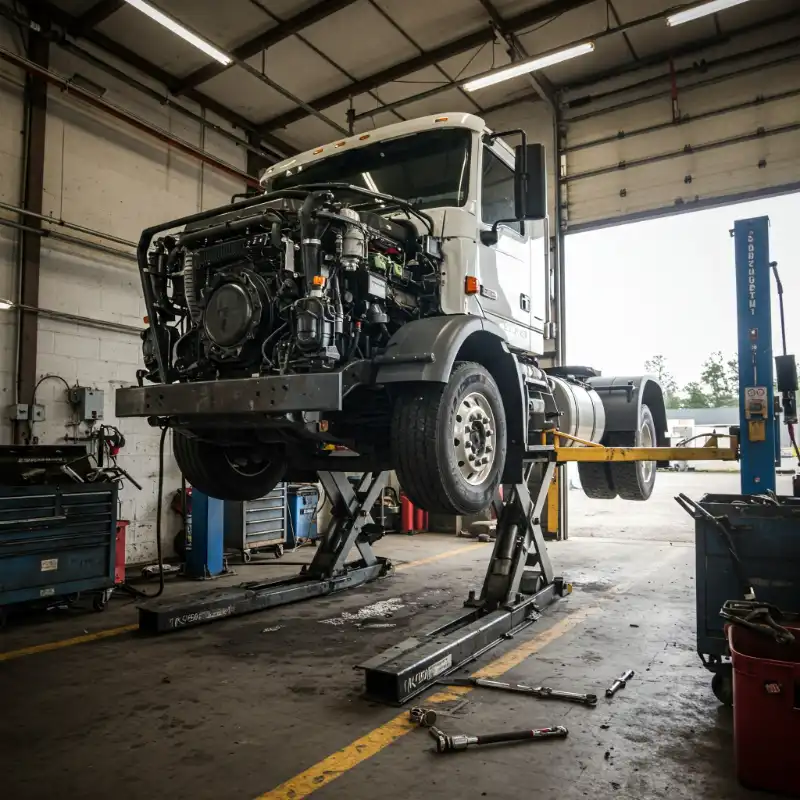Understanding the Importance of Axle Maintenance
Axles are a fundamental component of any vehicle, playing a role in driving stability, control, and safety. In the context of commercial trucks, axles support the weight of the vehicle and its cargo, transmitting power from the engine to the wheels. There are different types of axles:
- Front Axles: Front axles are crucial for steering the vehicle. They support the weight of the front of the truck and handle the forces during steering and braking.
- Rear Axles: Rear axles provide the driving power to the wheels. They are essential for transmitting power from the engine to the wheels, allowing the truck to move. Keeping them in good condition ensures efficient power delivery and stability.
- Trailer Axles: Trailer axles support the load of the trailers attached to the truck. They bear the weight of the cargo, ensuring that the load is distributed evenly.
Each type of axle must be maintained to ensure optimal performance. A well-maintained axle contributes to better fuel efficiency, smoother rides, and increased safety. Conversely, a faulty axle can lead to severe consequences, including accidents and costly repairs.
Consequences of Neglecting Axle Maintenance
Neglecting axle maintenance can have serious repercussions. For instance, a study by the Federal Motor Carrier Safety Administration (FMCSA) found that axle-related issues are a significant cause of commercial vehicle breakdowns. Faulty axles can lead to:
- Accidents and Hazards: A broken axle can cause loss of control, leading to accidents. Commercial trucks, due to their size and weight, can cause extensive damage and injuries in such scenarios.
- Increased Wear and Tear on Other Components: Ignoring axle issues can lead to increased stress on other vehicle parts, such as the suspension system, tires, and drivetrain, leading to more frequent repairs and higher costs.
Conducting a Visual Inspection
Regular visual inspections are crucial for early detection of axle issues. Here are some common signs to look for:
- Cracks, Bends, and Rust: Inspect the axle for any visible cracks or bends. Rust can indicate a weakening of the axle structure, which can compromise safety.
- Leaks: Look for any fluid leaks around the axle area. This can indicate problems with the axle seal or differential.
Checking Axle Boots and Joints
Axle boots and joints are also critical areas to inspect:
- CV Boots: Constant Velocity (CV) boots protect the CV joints from dirt and moisture. Check for cracks or leaks in these boots, as damaged boots can lead to joint failure.
- Universal Joints (U-joints): Evaluate the condition of U-joints, looking for signs of excessive wear or rust. Faulty U-joints can cause vibrations and unusual noises during driving.
Testing Axle Performance
Listening for Unusual Noises
Listening to your vehicle can provide early warning signs of axle issues. Pay attention to:
- Clunking, Clicking, and Grinding Sounds: These noises can indicate problems with the axle or related components. Clunking may occur due to worn U-joints, while clicking and grinding sounds can signal CV joint issues.
- Noise During Acceleration, Deceleration, and Turns: If you hear unusual sounds during these actions, it’s essential to diagnose the problem promptly to avoid further damage.
Monitoring Vehicle Handling and Vibrations
Axle problems often manifest as changes in vehicle handling and vibrations:
- Vibrations or Wobbling: If you experience vibrations while driving, particularly at higher speeds, it may be due to axle damage or imbalance.
- Steering Responsiveness and Alignment Issues: Poor steering response or alignment issues can also be linked to axle problems. Ensure that the vehicle tracks straight and does not pull to one side.
Performing Routine Maintenance
Lubrication and Greasing
Proper lubrication is essential for axle longevity:
- Importance of Lubrication: Keeping axles and joints well-lubricated reduces friction and wear, preventing premature failure.
- Types of Lubricants and Greases: Use the recommended types of lubricants and greases for your specific vehicle. Check the manufacturer’s guidelines for the correct products and intervals.
Tightening and Torqueing
Ensuring that all components are correctly tightened is crucial:
- Ensuring All Bolts and Nuts Are Correctly Tightened: Loose bolts and nuts can lead to axle misalignment and increased wear. Regularly check and tighten these components.
- Proper Torque Settings: Use a torque wrench to apply the correct amount of force when tightening bolts. Refer to the vehicle’s manual for the appropriate torque settings for different components.
Replacing or Repairing Axles
When to Replace Your Axles
Knowing when to replace axles can prevent further damage and ensure safety:
- Signs That Indicate a Need for Axle Replacement: Severe cracks, bends, or significant wear are clear indicators that an axle needs replacement. Other signs include persistent vibrations, noise, and poor handling even after maintenance.
- Recommended Mileage Intervals: While axle lifespan varies, it’s generally advisable to inspect and potentially replace axles every 100,000 to 150,000 miles, depending on usage and conditions.
DIY vs. Professional Repair
Deciding between DIY repairs and professional services depends on the issue’s complexity:
- Tools and Skills Required for DIY Axle Repair: Basic tools like wrenches, jacks, and torque wrenches are necessary for DIY repairs. However, understanding the axle system and following safety protocols are crucial.
- When to Seek Professional Assistance: For complex issues, such as axle replacement or severe damage, it’s best to consult a professional mechanic. They have the expertise and tools to ensure the repair is done correctly and safely.
Recap
Maintaining your truck’s axles is a vital part of ensuring safety, performance, and efficiency in the commercial trucking industry. Regular axle maintenance not only prolongs the life of your vehicle but also ensures the safety of your drivers and other road users. Stay vigilant, and keep your axles road-ready!
If you require axle maintenance services in Texas, please visit our Truck Axle Repair Services page.










.webp)





























